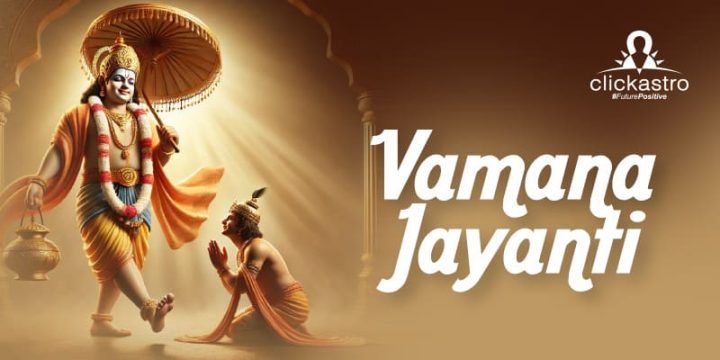Contents[hide]
Introduction
Vamana Jayanti celebrates the fifth incarnation of Lord Vishnu, known as Vamana. This significant event is observed on the Dwadashi Tithi of Shukla Paksha during the Bhadrapada month, typically falling in August or September in the Gregorian calendar.In 2025, Vamana Jayanthi falls on Thursday, 4th September.The day marks the birth of Lord Vamana, who took the form of a dwarf Brahmin to protect the Devas (gods) and restore cosmic balance by humbling the mighty demon king, Mahabali. Vamana Jayanti is not just a celebration of a divine birth but also a commemoration of the victory of good over evil and the importance of humility and righteousness. Through various rituals, fasting, and prayers, devotees express their devotion and seek the blessings of Lord Vishnu, making this day a pivotal part of the spiritual calendar.
On Vamana Jayanti, uncover what your birth chart reveals!
Important timings
- Dwadashi Tithi Begins – 01:51 AM on Sep 04, 2025
- Dwadashi Tithi Ends – 01:38 AM on Sep 05, 2025
- Shravana Nakshatra Begins – 09:14 PM on Sep 04, 2025
- Shravana Nakshatra Ends – 09:08 PM on Sep 05, 2025
The Story of Vamana Jayanti
The story of Vamana Jayanti is a captivating narrative deeply rooted in ancient history, showcasing the divine intervention of Lord Vishnu to restore cosmic balance and curb the escalating power of King Mahabali, an Asura (demon) king. Mahabali was a mighty and benevolent ruler, widely respected and adored by his subjects for his generosity and sense of justice. Despite being an Asura, he was a devout follower of Lord Vishnu, which made him a unique and complex character.
Mahabali’s ambition, however, knew no bounds. He aspired to conquer not only the Earth but also the Heavens, aiming to establish his dominance over the entire universe. According to the Shastras, anyone who completed 100 Yagnas (sacrificial rituals) would be endowed with the power to rule the universe. Mahabali had already completed 99 Yagnas and was on the brink of performing his 100th, which would have granted him unparalleled power, potentially threatening the cosmic order.
Alarmed by this prospect, the Devas (gods), led by Lord Indra, grew anxious about the impending power shift. They feared that Mahabali’s rule, despite his virtues, could disrupt the balance between good and evil. In their desperation, they turned to Lord Vishnu, the preserver of the universe, seeking his intervention to prevent Mahabali from completing his final Yagna.
In response to their plea, Lord Vishnu decided to incarnate as Vamana, a dwarf Brahmin, for his fifth avatar. Disguised in this humble form, Vamana approached King Mahabali during the Yagna and requested a seemingly modest boon: three paces of land, measured by his small feet. Amused by the simplicity of the request and confident in his power, Mahabali readily agreed.
To Mahabali’s astonishment, Vamana then began to grow in size, assuming a gigantic form. With his first step, Vamana covered the entire Earth, symbolising his dominion over the mortal realm. With his second step, he spanned the heavens, asserting his authority over the celestial domain. When it came to the third step, there was no space left to place his foot. Realising that Vamana was none other than Lord Vishnu himself, Mahabali humbly offered his head as the third step. Vamana placed his foot on Mahabali’s head, pushing him into the Patal Loka (netherworld), effectively curbing his ambition and preserving the balance of the universe.
Despite his defeat, Mahabali’s devotion and righteousness did not go unrecognised. Moved by his humility and devotion, Lord Vishnu granted him a boon: the king could return to his kingdom once a year to visit his people, a tradition that is celebrated annually in Kerala as the festival of Onam. This story not only highlights the divine wisdom of Lord Vishnu but also serves as a timeless reminder of the virtues of humility and devotion and the importance of maintaining balance in life.
Significance of Vamana Jayanti
Vamana Jayanti is a festival of deep spiritual significance, embodying the eternal victory of good over evil and the virtues of humility and righteousness. The story of Lord Vamana, the fifth avatar of Lord Vishnu, is a powerful reminder that even the mightiest beings must temper their strength and ambition with humility and devotion. King Mahabali, despite his power and virtues, allowed pride to lead him toward a path that threatened the balance of the universe. Through his Vamana incarnation, Lord Vishnu not only curtailed Mahabali’s growing power but also taught the invaluable lesson that no matter how powerful one becomes, humility must prevail. The day of Vamana Jayanti is, therefore, a time for reflection on the importance of these virtues in one’s life. Devotees believe that by worshipping Lord Vamana, they can seek forgiveness for their past sins and receive the blessings of Lord Vishnu, the preserver of the universe. Observing the rituals and fasting on this day is seen as a way to align oneself with the divine qualities of Lord Vishnu, reinforcing the values of humility, devotion, and righteousness. The celebration of Vamana Jayanti thus serves as a reminder of the timeless moral principles that sustain the cosmic order and human life.Rituals Observed on Vamana Jayanti
On Vamana Jayanti, devotees rise early, take a holy bath, and don clean clothes in preparation for the day’s rituals. The rituals begin with placing an idol or image of Lord Vamana in their homes. Devotees then perform Panchopachara or Shodashopachara Puja, which involves offering 16 different items, including flowers, incense sticks, lamps, and Naivedya (food offerings), to please Lord Vishnu.- Observing a Fast: Many devotees observe a strict fast on Vamana Jayanti. This fast is believed to absolve sins and bring blessings from Lord Vishnu. The fast typically lasts from sunrise to sunset, and those who observe it refrain from consuming food and water during this period.
- Vishnu Sahasranama Recitation: The chanting of the Vishnu Sahasranama (a hymn comprising 1,000 names of Lord Vishnu) is an integral part of the Vamana Jayanti rituals. Devotees also recite other mantras dedicated to Lord Vishnu, seeking his protection and blessings.
- Listening to Vamana Katha: In the evening, devotees gather to listen to the Vamana Katha, the story of Lord Vamana’s incarnation. This narration is considered highly auspicious and helps devotees understand the significance of the day.
- Donating to Brahmins and the Needy: On Vamana Jayanti, it is considered highly auspicious to donate food, clothes, and money to Brahmins and the poor. Offering curd, rice, and other food items to Brahmins is particularly significant, as these are believed to please Lord Vishnu.
- Offering Bhog and Prasad: After the Puja and recitation of mantras, devotees prepare a special offering, or Bhog, for Lord Vishnu. This Bhog is then distributed as Prasad among family members and other devotees, symbolising the sharing of divine blessings.







